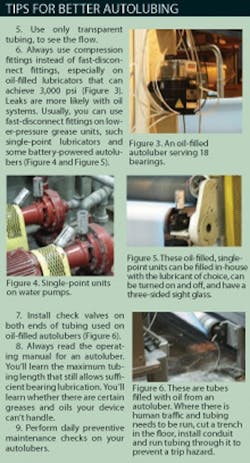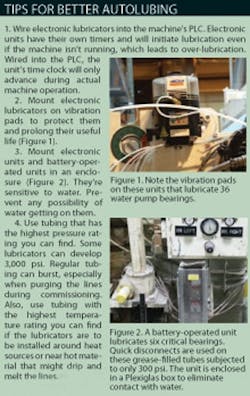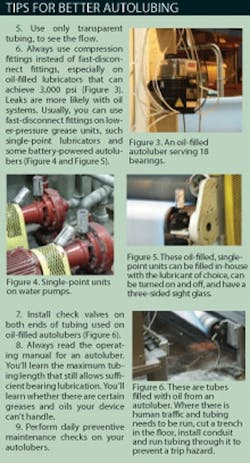Clopay Plastics in Augusta, Ky., never heard of automated lubrication until six years ago, when machine reliability became more of a focus for our plant. Unplanned downtime reports from our CMMS told us that staying competitive meant that machine reliability must improve. Like most plants, we operate with limited maintenance staffing. Therefore, adding more bodies to handle preventive maintenance procedures simply isn’t realistic.
One area of great focus here is lubrication. We consider lubrication to be the backbone of all maintenance systems. We wanted to know how to serve the plant’s lubrication demands most effectively and efficiently. Manual lubrication consumes labor hours and, in most cases, the machine being lubed must be idle for safe access to the lube points.
But, inserting grease into bearings when a machine is idle isn’t considered to be a best practice. Our own breakdown analyses and the reports from the consultants who we brought in to review some bearings both made it obvious to us that our failures were caused by insufficient lube, wrong lube, contamination, over-lubrication and insufficient training for the technicians doing the manual lubing. In the plastic film-extrusion business, avoiding drag on bearings is crucial because drag affects the fragile plastic web as it threads through the many idler rolls on the equipment that carries the film.
Possible solution
These were some of the factors that led us to a closer examination of the world of automatic lubrication. The big advantages we see in automatic lubrication are the labor savings and the assurance that bearings unambiguously get lubed at the right time with the right lube in the right amount with no contamination.
There’s no advantage to Clopay having personnel assigned full-time to walk a route with an oil can. Manual lubrication isn’t as effective as automatic lubrication for at least two reasons. In our plant, one can’t get to the many areas that need lubrication safely while the machine is in production. With manual lubrication, the chances are much greater for getting contamination into a bearing.
We don’t believe that manually lubricating an idle machine will distribute the lube uniformly, whereas automated lubrication on an operating machine consumes less grease and distributes it more uniformly over the bearing surfaces. We considered what happens to a lubrication program when one of our lube routes is neglected because the technician assigned to it is on vacation or not available for some reason. Autolubers are always on the job. I’d think every plant out there can benefit from using autolubers on critical bearings.
Tradeoffs
As with anything, there’s a cost associated with purchasing and installing automated lubrication systems. You only have to calculate the cost of failed bearings, machine downtime, late product deliveries to customers and safety issues involved in replacing bearings ruined by improper lubrication to see that automated lubrication costs pennies compared to the expenses of replacing bearings, gearboxes, customers, production time and wasted product.
At our facilities, the bottom line for our automated lubrication systems has been increased uptime, fewer gearbox purchases, fewer bearing purchases and the disappearance of many other lube-related failures.
Special considerations
Don’t let the term automated lubrication overwhelm you. The automatic systems we selected are reliable and user-friendly, but like any piece of equipment in your facility, they need technicians who are trained to troubleshoot them should they misbehave. Our plant developed standard operating practices for each type of autoluber, delineated routes showing where the autoluber is located, and published charts that show the type and amount of lubricant, as well as how to handle discarded lubricant. Finally, as one does for any piece of functioning equipment, we maintain a supply of spare units and component parts.
Scotty Lippert is the planned maintenance technician and machinery lubrication specialist at Clopay Plastic Products Co., Augusta, Ky. Contact him at [email protected] and (606) 756-2131, ext. 2309.


